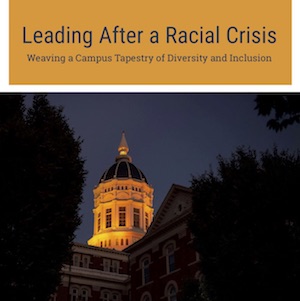 In October 2015, several racist incidents occurred on the campus of the University of Missouri at Columbia. Students did not approve of the administration’s reactions to these incidents and a large protest movement developed.
In October 2015, several racist incidents occurred on the campus of the University of Missouri at Columbia. Students did not approve of the administration’s reactions to these incidents and a large protest movement developed.
On November 2, graduate student Jonathan L. Butler began a hunger strike, saying he would not eat until Tim Wolfe, president of the University of Missouri System resigned or was forced out of office. The crisis escalated on Saturday, November 7, when players on the University of Missouri football team stated that they would not participate in any football-related activities until Wolfe was no longer president. The coaching staff supported its players. Faculty called for a walkout of classes on Monday and Tuesday in support of student protesters. And hundreds of alumni signed a letter to Governor Jay Nixon calling for Wolfe’s ouster. On November 9, Wolfe resigned and he was quickly followed by the resignation of the chancellor of the flagship Columbia campus.
The American Council on Education recently released a report documenting the steps the University of Missouri has taken over the past five years to address the problems that led to the protests in 2015. The report documents the activities that have helped the university system make progress, including its Inclusive Excellence Framework, leadership training, and resource investment in diversity, equity, and inclusion work at all four University of Missouri campuses, in addition to engagement with the local community. These improvements have upgraded the university’s assessed capacity to effectively respond to diversity, equity, and inclusion issues.
The report states that “campus leaders would be mistaken to think that time alone will heal the wounds that are inflicted by racial crises. Real healing only occurs through hard, intentional work on issues of diversity, equity, and inclusion — work that is continuous and without an expected end date.”
One key component in the recovery effort is relationship building. Several years after the crisis, relationship building requires multiple levels of engagement between leaders, key stakeholder groups, and members of the community, the report states. When communities are fractured and feel uninformed about decisions that are being made on their campus, it is even more imperative that senior-level administrators are on the ground connecting with the community. In this way, community members can know who their leaders are, feel comfortable approaching them to offer feedback, share their perceptions and experiences, and offer their insights on how the campus can make progress.
The full report, Leading After a Racial Crisis: Weaving a Campus Tapestry of Diversity and Inclusion, may be downloaded by clicking here.












